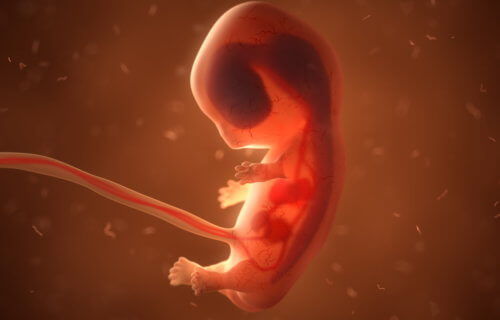BOSTON, Mass. — Testing positive for COVID-19 while pregnant could affect your baby’s growth and brain development, according to researchers from Boston Medical Center. Study authors found high inflammatory levels in mothers who had a coronavirus infection during pregnancy, which increases the risk of miscarriage and problems with fetal development.
The virus that causes COVID-19 affected 14 of every 1,000 births in the U.S. in 2020. While passing on the virus to an infant during pregnancy is rare, the new study finds elevated levels of interleukin (IL)-6 and interferon gamma-induced protein (IP)-10. Both are inflammatory markers important in the immune response against the SARS-CoV-2 virus. In infants, the team also found elevated IL-8 levels in infants following a COVID-19 infection from the mother.
High IL-6 and IL-8 levels display a link to miscarriage, preeclampsia, and preterm delivery. Elevated IP-10 levels also have a connection to miscarriage and preeclampsia, but it is unknown what effects it has on the infant. Previous research suggests in-utero inflammation can continue weeks to months after maternal infection.
“This inflammation has the potential to significantly impact infant growth and development, highlighting the importance of continuing to follow children with COVID-19 exposure during pregnancy for unknown long-term consequences on their health,” says Elizabeth Taglauer, MD, PhD, a neonatologist at Boston Medical Center and an assistant professor of pediatrics at Boston University School of Medicine, in a media release. “This study also importantly provides additional reasons to encourage pregnant women to pursue vaccination against COVID-19 to avoid any long-term adverse consequences for their infant.”
Cytokines reveal COVID complications
Between June 2020 and June 2021, pregnant women in the early and late stages of pregnancy were enrolled in their study if they were infected with a COVID-19. A separate control group involved pregnant mothers who tested negative for SARS-CoV-2 at the time of delivery. People who received a COVID-19 vaccine did not take part in the study.
Upon giving birth, researchers collected blood samples from both the mother and newborn. In total, they collected blood samples from 31 people in the COVID group and 29 people in the control group. They analyzed the samples with a panel of 13 cytokines, which are markers of an active immune response before comparing them between groups.
“The results of our study indicate that a COVID-19 infection during pregnancy creates an inflammatory in-utero environment, with evidence of prolonged inflammation in infant blood markers at the time of delivery,” says Elisha Wachman, MD, a neonatologist at Boston Medical Center and associate professor of pediatrics at Boston University School of Medicine. “This could lead to alterations in infant growth and development as an unforeseen complication from COVID-19 infection during pregnancy.”
Future research is focusing on mothers who had the COVID-19 vaccination during pregnancy and who did not have a COVID-19 infection. Preliminary results suggest the inflammatory levels in mother and child are similar to the control group. In other words, there are no signs of high inflammation in the infants of vaccinated parents.
The study is published in the Journal of Perinatology.

